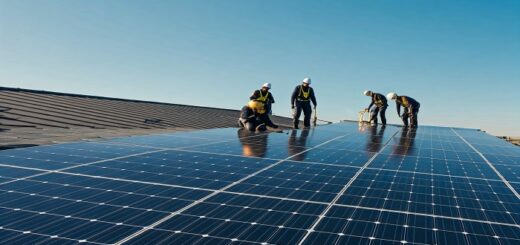How Much Does It Cost to Install a Solar Panel System in Nebraska?

How Much Does It Cost to Install a Solar Panel System in Nebraska
Solar energy is a great option for many homeowners in Nebraska. It helps save money and is good for the environment. If you are considering solar energy, you may wonder how much it costs to install a solar panel system in Nebraska. In this article, we will break down the costs, factors that affect pricing, financing options, and benefits of solar energy. How Much Does It Cost to Install a Solar Panel System in Nebraska?
Understanding Solar Panel Installation Costs
The average cost to install a solar panel system in Nebraska ranges from **$15,000 to $25,000** for a typical residential installation. But this number is not fixed. Several factors will influence the final price of your solar system.
Factors Affecting Solar Panel Costs
1. System Size
The size of your solar panel system is one of the most important factors. Larger systems produce more electricity but also cost more. The size you need depends on your home’s energy use. A small home may need a system producing around 5 kilowatts (kW). A larger home may need 10 kW or more.
Typical Sizes:
- 5 kW system: approximately $15,000 to $20,000
- 10 kW system: approximately $25,000 to $30,000
2. Type of Solar Panels
There are different types of solar panels available. Some panels are more efficient than others. Higher efficiency panels might cost more upfront but can provide more power.
Types of Panels:
- Monocrystalline: More efficient but typically costs more.
- Polycrystalline: Less expensive, but less efficient.
- Thin-Film: Lightweight but usually less efficient and therefore less common for residential use.
3. Installation Costs
Installation costs can vary based on several factors. Labor costs will differ depending on the company you hire and the area where you live.
Average Installation Costs: Labor costs can range from **$1,000 to $5,000**, depending on the complexity of the installation.
4. Permits and Fees
Depending on your local regulations, you will need permits to install solar panels. These permits can add to your total cost.
Average Permit Costs: Permit fees can range from **$200 to $800**.
5. Roof Condition
Your roof plays an essential role in the installation process. If your roof needs repair or replacement, this can add extra costs.
Roof Repairs: Expect to pay anywhere from $1,500 to $5,000 for roof repairs, depending on the extent of the damage.
6. Battery Storage
If you want to store energy for later use, you may consider adding battery storage to your solar system. This will increase the overall cost.
Typical Battery Costs: Battery systems can range from $5,000 to $15,000, depending on the size and brand.
7. Inverter Costs
An inverter is necessary to convert the direct current (DC) electricity produced by the solar panels into alternating current (AC) electricity for your home.
Inverter Costs: Inverters typically cost between $1,000 and $3,000.
Overall Average Costs
Considering all these factors, here’s a breakdown of a typical installation cost:
5 kW System:
- Solar panels: $10,000
- Installation: $2,500
- Permits and fees: $300
- Inverter: $1,500
- Total: $14,300
10 kW System:
- Solar panels: $20,000
- Installation: $4,000
- Permits and fees: $700
- Inverter: $2,500
- Total: $27,200
Financial Incentives to Reduce Costs
Installing solar panels can seem expensive, but financial incentives can significantly reduce your costs. Here are some incentives available in Nebraska:
1. Federal Investment Tax Credit (ITC)
This federal program allows homeowners to deduct 30% of the installation cost from their federal taxes. This is a great way to lower your upfront costs.
Example: For a $20,000 installation, you can deduct $6,000 from your federal taxes.
2. Nebraska State Solar Tax Credit
Nebraska offers its own solar tax credit. Homeowners can receive a credit based on 25% of their installation costs, up to $25,000.
Example: If you install a $20,000 system, you could get a credit of $5,000.
3. Local Utility Rebates
Many utility companies offer rebates for installing solar panels. These vary by company, so check with your local providers.
4. Net Metering
Nebraska has a net metering policy, which allows homeowners with solar panels to send excess energy back to the grid. You earn credits on your utility bill for the energy you produce.
Financing Options for Solar Installations
If you cannot afford the upfront cost of solar panels, several financing options can help make it easier.
1. Cash Purchase
Buying the system outright is the most straightforward option. You own the system and will save the most in the long run.
2. Solar Loans
Many banks and credit unions offer solar loans. These loans allow you to pay for the system overtime. Monthly payments can fit into your budget.
Example: A typical solar loan might have an interest rate of 4-6%, spread out over 5-15 years.
3. Leases
You can lease a solar system from a solar company. You pay a monthly fee to use the system. The solar company owns the panels and is responsible for maintenance.
4. Power Purchase Agreements (PPAs)
With a PPA, you pay for the electricity your solar system produces. This is often at a lower rate than your local utility provides. Like leases, a PPA often requires no upfront costs.
The Benefits of Installing Solar Panels
Installing solar panels comes with many advantages. Here are some reasons to consider making the switch:
1. Lower Energy Bills
One of the most significant benefits of solar energy is the reduction in your electricity bills. When your solar panels produce energy, you use less electricity from the grid.
2. Increase Home Value
Homes with solar installations typically sell for more than homes without solar. Prospective buyers see the value in having lower energy costs.
3. Environmental Impact
Solar energy is a clean source of power. It reduces your carbon footprint and helps combat climate change.
4. Energy Independence
By generating your own electricity, you rely less on the grid. This can be especially beneficial during power outages or when utility rates increase.
5. Job Creation
The solar industry creates jobs. From manufacturing to installation, jobs in renewable energy are growing.
6. Energy Incentives
As discussed earlier, there are various incentives and tax breaks available for solar installations, making them more affordable.
Read More: Complete Guide to Solar Panel Systems in Nebraska
Understanding the Installation Process
Once you decide to install solar panels, it’s essential to understand the process. Here are the key steps involved in the installation of solar panels in Nebraska:
1. Evaluate Your Energy Needs
Start by evaluating your energy consumption. Review your utility bills to understand how much energy you use. This will help determine the size of the solar system you need.
2. Research Solar Companies
Look for reputable solar companies in Nebraska. Check online reviews and compare quotes from multiple providers. This will ensure that you get the best service and price.
3. Schedule a Consultation
Most solar providers offer free consultations. They will evaluate your home and energy needs during this meeting.
4. Review Quotes and Contracts
After the consultation, you will receive quotes. Review these carefully. Look for any hidden costs or fees. Ensure you understand the warranty and maintenance terms.
5. Obtain Permits
Before installation, you will need to acquire the necessary permits. Your solar company usually helps with this process.
6. Install the Panels
Installation typically takes one to three days. The solar company will set up the panels and connect them to the inverter and electrical system.
7. Final Inspection
After installation, a final inspection will occur to ensure everything meets local codes. This step is crucial for safety and functionality.
8. Enjoy Your Solar Energy
Once everything is in place, you can start benefitting from your solar energy system. Monitor its performance and enjoy lower energy bills.
Maintenance of Solar Panel Systems
Solar panels require very little maintenance to keep them running efficiently. Here are some simple maintenance tips:
1. Regular Cleaning: Keep your solar panels clean for optimal performance. Dust, pollen, and debris can block sunlight. Use a hose or a soft cloth to clean them.
2. Monitor Performance: Many solar systems come with monitoring tools. Regularly check the output to ensure everything functions properly.
3. Professional Inspections: Schedule a professional inspection every few years. They can catch potential issues before they become significant problems.
Common Misconceptions About Solar Energy
1. Solar Panels Don’t Work in Winter: This is false. Solar panels can generate electricity even on cloudy days or during winter months. Cold temperatures can improve their efficiency.
2. Solar Energy is Too Expensive: While there is an upfront cost, financial incentives and savings on energy bills make solar a cost-effective option over time.
3. All Solar Panels are the Same: Different panels offer varying levels of efficiency, durability, and price. Research to find the right one for your needs.
4. Solar Requires a Lot of Maintenance: Solar systems are low maintenance. Routine care is simple and manageable.
Conclusion
Installing a solar panel system in Nebraska is a smart choice for homeowners. While upfront costs can seem high, various factors influence the total price. Financial incentives can significantly reduce out-of-pocket expenses. Plus, the long-term savings on energy bills can make solar an excellent investment.
Carefully consider the size, type of panels, and installation options. Research and obtain multiple quotes before deciding. Enjoy the benefits of clean energy and lower energy costs. Solar energy helps protect the environment and can make your home more valuable.
If you’re ready to consider solar energy, now is the time to act. The sun is shining, and the benefits of solar are brighter than ever! Embrace change and invest in a sustainable future for yourself and future generations.
How Much Does It Cost to Install a Solar Panel System in Nebraska?

















